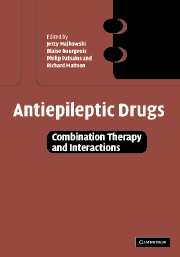Book contents
- Frontmatter
- Contents
- List of contributors
- Foreword
- Foreword
- Acknowledgements
- Part I Introduction
- Part II Pharmacokinetic interactions
- Part III Pharmacodynamic interactions
- Part IV Drug interactions in specific patient populations and special conditions
- 14 Antiepileptic drug interactions in children
- 15 Antiepileptic drug interactions in the elderly
- 16 Antiepileptic drug interactions in pregnancy
- 17 Antiepileptic drug interactions in handicapped and mentally retarded patients
- 18 Antiepileptic drugs and sex steroids
- 19 Antiepileptic drug interactions in patients requiring psychiatric drug treatment
- 20 Antiepileptic drugs in non-epileptic health conditions: possible interactions
- 21 Drug monitoring in combination therapy
- 22 Cognitive side-effects due to antiepileptic drug combinations and interactions
- Part V Conclusions and future perspectives
- Index
17 - Antiepileptic drug interactions in handicapped and mentally retarded patients
from Part IV - Drug interactions in specific patient populations and special conditions
Published online by Cambridge University Press: 07 September 2009
- Frontmatter
- Contents
- List of contributors
- Foreword
- Foreword
- Acknowledgements
- Part I Introduction
- Part II Pharmacokinetic interactions
- Part III Pharmacodynamic interactions
- Part IV Drug interactions in specific patient populations and special conditions
- 14 Antiepileptic drug interactions in children
- 15 Antiepileptic drug interactions in the elderly
- 16 Antiepileptic drug interactions in pregnancy
- 17 Antiepileptic drug interactions in handicapped and mentally retarded patients
- 18 Antiepileptic drugs and sex steroids
- 19 Antiepileptic drug interactions in patients requiring psychiatric drug treatment
- 20 Antiepileptic drugs in non-epileptic health conditions: possible interactions
- 21 Drug monitoring in combination therapy
- 22 Cognitive side-effects due to antiepileptic drug combinations and interactions
- Part V Conclusions and future perspectives
- Index
Summary
Introduction
Epilepsy in the mentally retarded differs from epilepsy in the mentally normal patient in relation to etiology, seizure types, epilepsy syndromes, choice of antiepileptic drugs, identification of their side effects and treatment outcome. Consequently, a successful antiepileptic drug therapy is a demanding task in terms of choice of drug therapy, combinations of drugs and side effects in mentally retarded patients compared with mentally normal people. Adverse effects and interactions between different antiepileptic drugs are a potential risk in the presence of many and difficult-to-treat seizure types, leading to frequent polytherapy. There is also an increased risk of interactions between antiepileptic drugs and other drugs because of the increased incidence of co-morbidity among these patients.
In patients who are handicapped or mentally retarded, there is no evidence that pharmacokinetic drug interactions per se are quantitatively or qualitatively different from those seen in otherwise normal epilepsy patients. However, it is the context of the treatment of their epilepsy that puts a different emphasis on the potential for interactions. These patients are characterized by an increased incidence of co-morbidity that may require treatment with other medications. Their epilepsies are generally more refractory to treatment and antiepileptic drug combinations are more likely to be used. Also, central nervous system (CNS) toxicity of drugs may be more prominent in mentally retarded patients, and this may include neurotoxic pharmacodynamic interactions between antiepileptic drugs as well as pharmacodynamic interactions between antiepileptic drugs and other psychotropic drugs.
Keywords
- Type
- Chapter
- Information
- Antiepileptic DrugsCombination Therapy and Interactions, pp. 325 - 340Publisher: Cambridge University PressPrint publication year: 2005



